The Intel Skull Canyon NUC6i7KYK mini-PC Review
by Ganesh T S on May 23, 2016 8:00 AM ESTPerformance Metrics - I
The Intel NUC6i7KYK (Skull Canyon) was evaluated using our standard test suite for low power desktops / industrial PCs. Not all benchmarks were processed on all the machines due to updates in our testing procedures. Therefore, the list of PCs in each graph might not be the same. In the first section, we will be looking at SYSmark 2014, as well as some of the Futuremark benchmarks.
BAPCo SYSmark 2014
BAPCo's SYSmark 2014 is an application-based benchmark that uses real-world applications to replay usage patterns of business users in the areas of office productivity, media creation and data/financial analysis. Scores are meant to be compared against a reference desktop (HP ProDesk 600 G1 with a Core i3-4130, 4GB RAM and a 500GB hard drive) that scores 1000 in each of the scenarios. A score of, say, 2000, would imply that the system under test is twice as fast as the reference system.
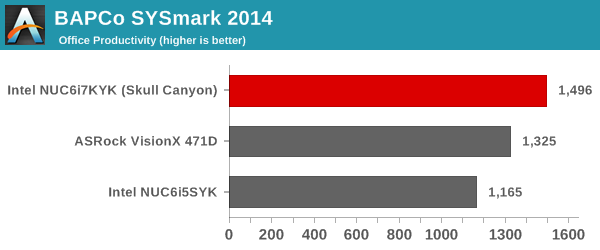
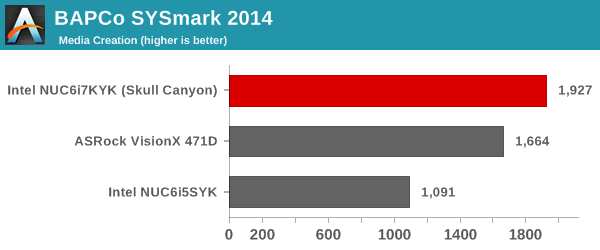
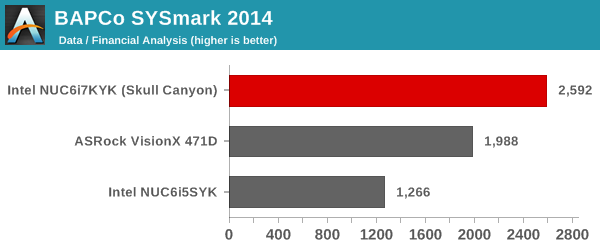
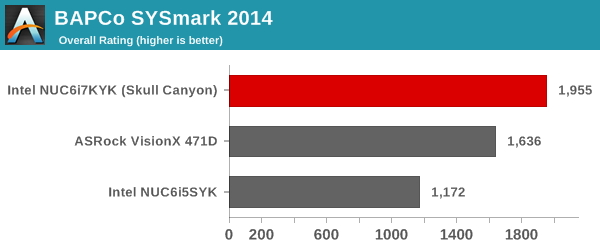
We started using SYSmark 2014 quite recently, which is the main reason for the absence of many of the comparison systems in the above graphs. In any case, the most interesting of the compared lot when it comes to CPU-intensive benchmarks like SYSmark 2014 is the ASRock VisionX 471D, equipped with a Core i7-4712MQ processor. We can see that the Core i7-6770HQ-based Skull Canyon NUC6i7KYK is miles ahead of the other two systems when it comes to office / business workloads. Readers interested in comparing the SYSmark 2014 scores for systems based on other CPUs can peruse the Bench results here.
Futuremark PCMark 8
PCMark 8 provides various usage scenarios (home, creative and work) and offers ways to benchmark both baseline (CPU-only) as well as OpenCL accelerated (CPU + GPU) performance. We benchmarked select PCs for the OpenCL accelerated performance in all three usage scenarios. These scores are heavily influenced by the CPU in the system. As expected, the Core i7-6770HQ enables the NUC6i7KYK to easily come out on top in the charts.
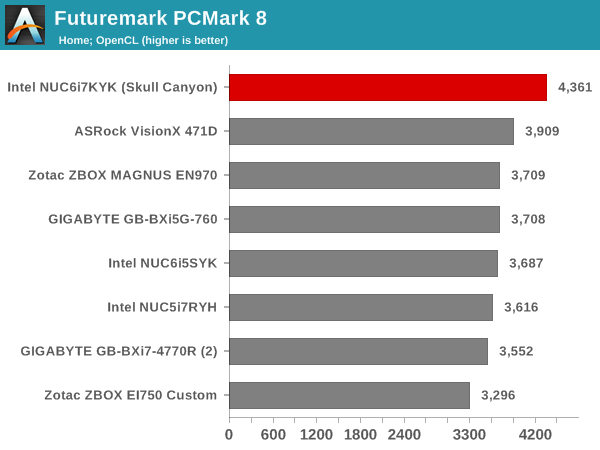
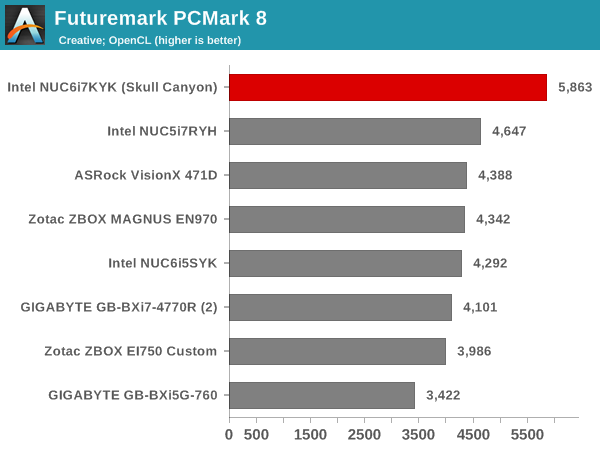
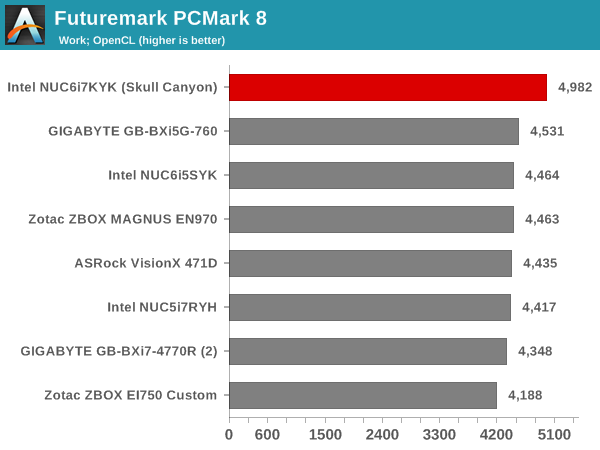
Miscellaneous Futuremark Benchmarks
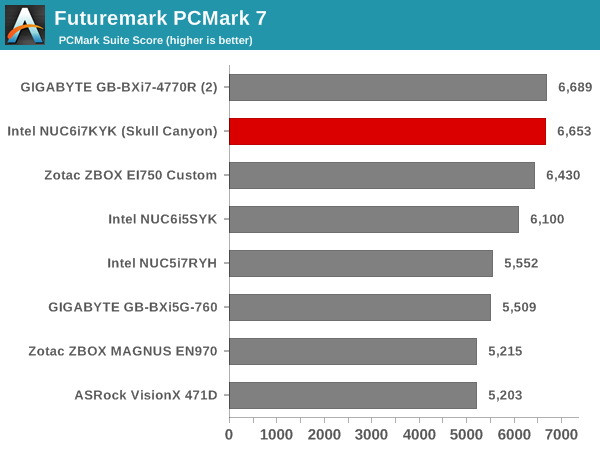
The graphics benchmarks present a different story, though. In these, the NUC6i7KYK does perform well enough to come in the top half. However, in scenarios which are not CPU-bound, the systems equipped with discrete GPUs easily turn out to be better than Skull Canyon.
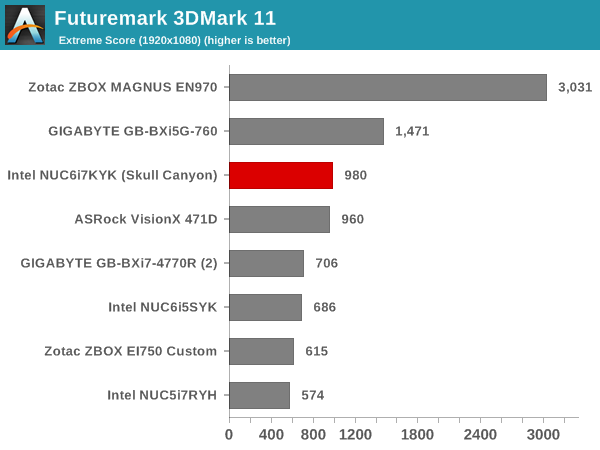
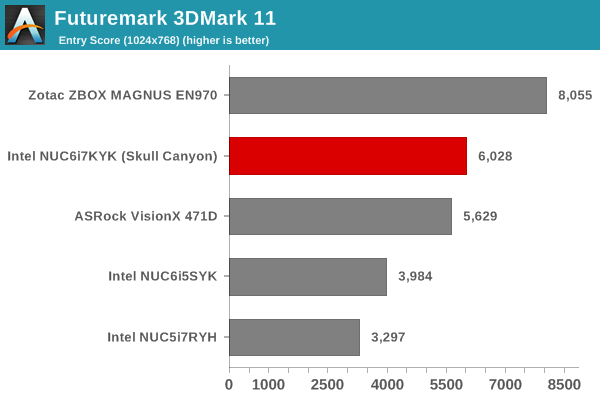
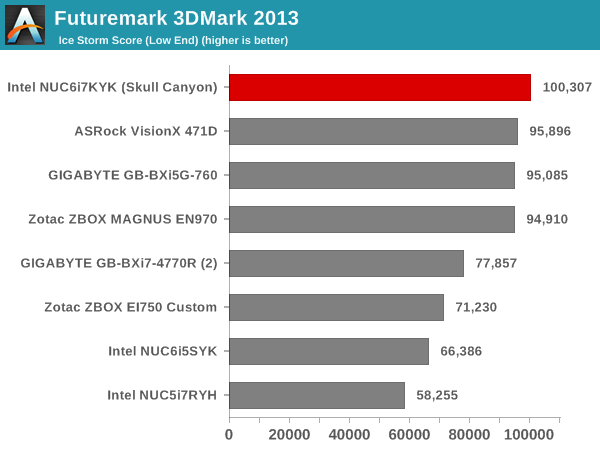
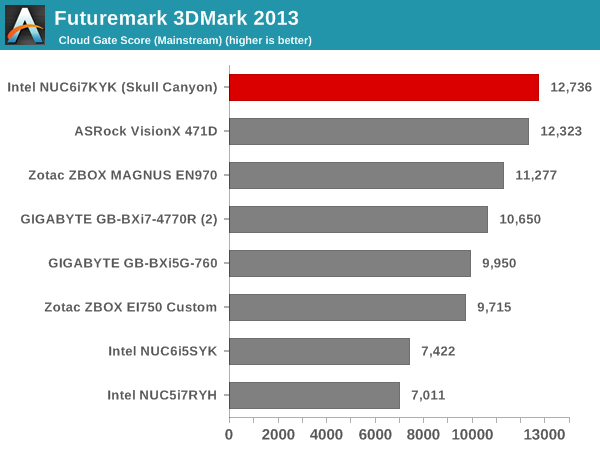
3D Rendering - CINEBENCH R15
CINEBENCH R15 is a standard benchmark for 3D rendering. It provides three benchmark modes - OpenGL, single threaded and multi-threaded. Evaluation of select PCs in all three modes provided us the following results.
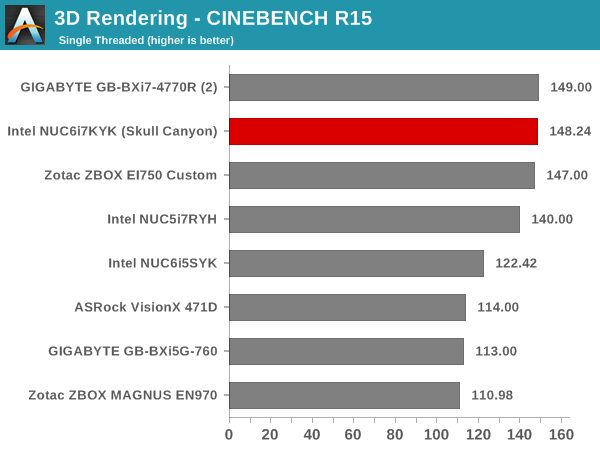
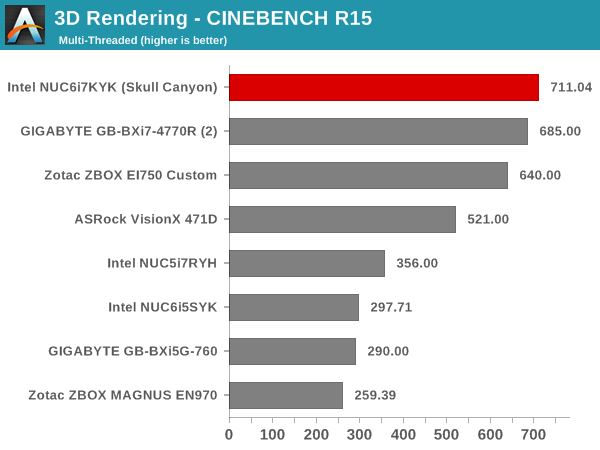
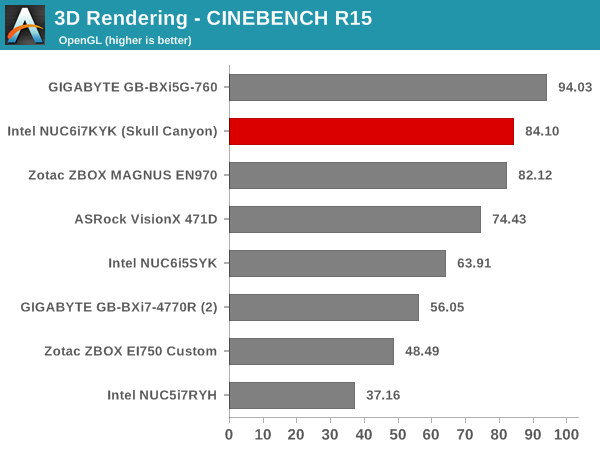
In the single-threaded case, the Core i7-4770R (a 65W TDP CPU which can turbo up to 3.9 GHz) performs slightly better than the Core i7-6770HQ. However, the latter wins out in the multi-threaded cases. In the OpenGL case, the GIGABYTE system with the discrete GPU wins out, showing that a combination of CPU power as well as GPU is needed to perform well in this benchmark.










133 Comments
View All Comments
JohnGalt1717 - Monday, May 23, 2016 - link
Can someone tell me if they have been able to run 4x 4K monitors (i.e. HDMI hooked to one, mDp hooked to another and then 2 mDp hooked via adapter to the Thunderbolt 3 port)?Looking to replace my desktop but need 4 screens.
DanNeely - Monday, May 23, 2016 - link
Unfortunately while you'd have the connectivity to do so, I think Intel's IGP itself is still capped at 3 displays.BurntMyBacon - Tuesday, May 24, 2016 - link
@JohnGalt1717: "Can someone tell me if they have been able to run 4x 4K monitors ..."I just tried it with a slightly different setup, but it was still an HQ processor with Iris Pro 580 (i7-6870HQ). It looks like DanNeely is correct. The IGP is still capped at 3 displays even without considering 4K.
JohnGalt1717 - Wednesday, May 25, 2016 - link
too Bad :<xchaotic - Monday, May 23, 2016 - link
What is the expected market for this? For both my professional and personal uses, lack of proper dGPU support is a deal breaker - for anything from games, through movie and photo enhancements to machine learning and graph stores all being accelerated by DGPUs, I suspect this will have a very limited to a very small subset of hardcore enthusiastblahsaysblah - Monday, May 23, 2016 - link
I had the NUC5i7, the machine was just too loud when used in professional manner. And it was ridiculous, they had space to put a better cooler.I had my doubts when initial mockups flew around internet. This is again another useless NUC. Crazy who has final say over design on this at Intel. They just keep shooting themselves in the foot. Seriously. They are afraid of success.
JoeyJoJo123 - Monday, May 23, 2016 - link
Not every game requires a dGPU, as many popular MOBAs play just fine without it, and there are people who play competitively for these games on worse hardware.This is nice as a HTPC, a thin-client, an emulation station, or a monitor/TV mounted PC for grandma or grandpa.
Understandably, this isn't a product you need, but do keep in mind that others on the market do want mini-PCs and can find a use for them.
JoeyJoJo123 - Monday, May 23, 2016 - link
Oh, also, the inclusion of Thunderbolt 3 means this could be a PC you can velcro to a external graphics card dock (like the Razer Core) to have a very portable LAN PC.LostWander - Monday, May 23, 2016 - link
It's mentioned in the article that the external graphics dock likely won't work because the thunderbolt port isn't given enough bandwidthLostWander - Monday, May 23, 2016 - link
won't work well*The link is only at a maximum PCIe 3.0 x4 under ideal conditions and it is separated from the CPU so the performance gain won't be optimal.